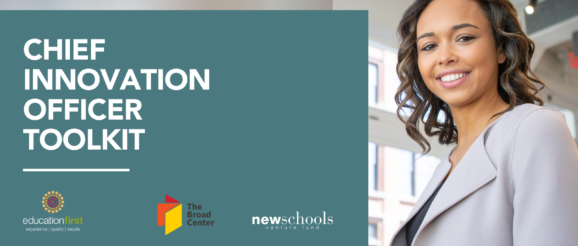Chief Innovation Officer Toolkit: A Reflection of What Drives My Work | The Broad Center

In partnership with NewSchools Venture Fund and Education First, The Broad Center recently released a new toolkit for Chief Innovation Officers (CIO). The resource was designed for those currently in, hiring for, or aspiring to be in a CIO role, providing guidance and reflective questions to help achieve equitable student outcomes. For me personally, the guide represents more – a reflection of what has driven my 25 years of working on behalf of young people.
My first job after graduating from college was as a project coordinator running LA Youth at Work for the Private Industry Council of the City of Los Angeles (I’m dating myself). I basically wrote the job description since I had interned on the project as it was launching. I drove around and met with Career and College counselors across 52 high schools in Los Angeles Unified School District. This was back in the 1990s when some high schools were on year-round, multi-track schedules because there were upwards of 4,000 students enrolled. It was also a time when the federal government provided subsidized employment opportunities for 15,000 young people depending on their family income (while over 250,000 students were eligible). I loved the idea of talking to employers, schools and students to help them get their first jobs. My work included spending long Saturdays at schools overseeing job skills seminars for students. Sometimes I would have to stand in because a volunteer did not show up or we had more students than volunteers. Working with students on filling out job applications, conducting mock interviews and helping them prepare for their job search exposed to me the gaps in our education system more than any other professional experience.
I realized the scale of the challenge when I went on to run the Youth 2 Leaders program which was conducted in nine cities: Atlanta, Chicago, Detroit, Houston, Los Angeles, New York, Oakland, Philadelphia and Washington DC. I spent four years managing a vast team of staff, advisors and volunteers, often working 12-hour days with 100 African American students who were engaged with adult leaders and elected officials on how to solve the most pressing issues in their communities. This experience further validated that the high school experience was not preparing students to apply their skills and knowledge to solve and improve their communities. Now these young people are adults, leveraging the learning opportunities that we helped provide them outside of the school day. While many high school students who need these skills the most do not have access to these opportunities, I knew high school could be a place where you could discover your passions, join clubs, participate in leadership opportunities, take electives that were interesting and apply your knowledge to real life.
Throughout my career I have focused on improving the education experience at scale. And fast forward now 25 years later, I have a high school student. High school has not changed much from my own experience (I graduated in 1989) and not much has changed from what I recall from my first job. Working now with superintendents and their chiefs has given me firsthand knowledge of how challenging it is to reimagine high school, develop a plan and implement with continuous improvement to lead to better results. It is possible. I remember seeing schools back in the early 2000s that had civics classes working with lawyers on creating Miranda rights – using teleconference technology so the lawyers could join the classroom live. I also remember going to a school in Louisiana where high school students were earning their drone certifications. It is possible.
Here we are in the worst crisis of our lifetime and schools are having to implement a first that many were not prepared to do – distance learning. Additionally, most districts are faced with crises ever year – teacher shortages, budget cuts, dilapidated buildings and the list goes on. Most superintendents and their leadership teams do not have the luxury of planning for the future or redesigning what the educational experience should look like for students who will work in jobs that have yet to be defined.
Currently at The Broad Center, I help develop and support education leaders who believe, like me, in the potential for the future of public education. To that end, CIOs play an important role in this work, developing and implementing a theory of change that places equity and innovation at the center. Their dedication and the support of the leaders around them helps enable school systems to remain focused on the progress we all want to see. I continue to believe that change is possible and am proud to share the new Chief Innovation Officer toolkit on behalf of the students that we all serve.
You can find the new Chief Innovation Officer toolkit and additional guides to support roles in school systems here, including Chief Operating Officer, Chief Talent Officer, Chief of Staff and Chief Financial Officer.
